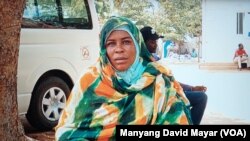Fariah Osman Abdallah, a Sudanese refugee at the settlement, shares her hardships since arriving two months ago. "There is no food, no water, and nothing has been given to us," she laments, expressing worry for her child who hasn't eaten anything since being admitted to the hospital.
To address the food shortage, the World Food Program, WFP, has been providing half-rations of food to registered refugees at Gorom through cash-based transfers. Long queues of Sudanese refugees form at the distribution center to receive their cash allowances.
However, for Muna Abdelrahim, the amount received - 50,000 South Sudanese Pounds, equivalent to 50 dollars for her family of eleven - is insufficient. She worries it will not be enough to sustain them, especially with sick children needing medical care and essential supplies like sorghum and sugar. "This money will not be enough for us. It is too little. It will finish today or tomorrow. And besides, I have children who are sick. I need to buy sorghum, sugar. What will this money buy? And they say it is for a month," she said.
The situation has drawn attention from South Sudanese national lawmakers, who are concerned about the dire humanitarian conditions faced by Sudanese refugees. Regina Aluel, chairperson of the Specialized Committee for Human Rights and Humanitarian Affairs in the national legislative assembly, urges the government and various agencies to step up and provide the necessary humanitarian support. "I call upon the minister of humanitarian affairs, Human Rights Commission, and other humanitarian agencies in South Sudan to rise up with courage and provide humanitarian support to the Sudanese refugees," she stated.
National lawmaker Butrous Alison Magaya emphasizes the responsibility of the government to ensure basic services, including water, shelter, and healthcare, are provided to the refugees. "We used to say before that Sudanese and South Sudanese are one people in two countries. So, when they come here running from war, just like when some South Sudanese went to Khartoum during our war time, we need to make sure they have basic services like water, shelter, health services, and so on," he said.
John Dabbi, Deputy Head of the South Sudan Commission for Refugee Affairs, acknowledges the challenges faced in responding to the large influx of Sudanese refugees. "The funds from donors coming from Europe are no more available because they have their own crisis. The Ukraine crisis has taken all the resources that used to come to Africa, so the little they are doing, let us appreciate," he said.
Aid officials say South Sudan hosts over 25,000 refugees who have fled the conflict in Sudan. The overwhelming numbers are putting a strain on available resources and necessitate urgent assistance to improve their living conditions.

Forum